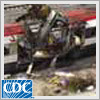
Listen to/view CDC podcasts on your computer or download them for reliable health
and safety information when and where you want it. New to podcasting? See
Podcast Help and RSS Help
Blast Injuries: What Clinicians Need to Know

In this podcast, Dr. Richard C. Hunt, Director of the CDC’s Division of Injury Response, National Center for Injury Prevention and Control provides a brief overview for health care providers on how to respond and care for persons injured by an explosion or blast event. Created: 11/5/2008 by National Center for Injury Prevention and Control (NCIPC), Division of Injury Response (DIR). Date Released: 11/6/2008. Series Name: CDC Featured Podcasts.
Press Play to listen to this CDC Podcast
Running time = 2:57
To save the Podcast, right click the "Save this file" link below and select the
"Save Target As..." option.
How are we
doing?
Podcasting Resources
Contact Us:
- Centers for Disease Control and Prevention
1600 Clifton Rd
Atlanta, GA 30333 - 800-CDC-INFO
(800-232-4636)
TTY: (888) 232-6348 - Contact CDC–INFO

